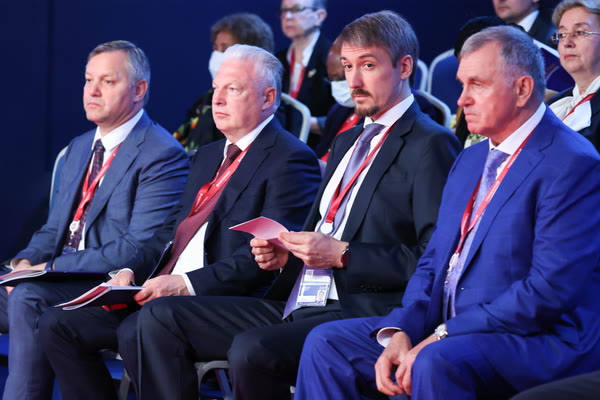
Integration for Development: New Horizons
Key conclusions
Preserving CIS at this stage is beneficial to all member states
“We are facing severe pressure from the West. First and foremost, it concerns two CIS countries – Russia and Belarus. It is a well-known fact that these sanctions affected our partners. <…> We took Commonwealth-wide measures to mitigate the pressure and negative effect on our economies. <…> At the meeting of the CIS Economic Council that took place on 10 June in Nur-Sultan, we jointly prepared a list of specific measures (of over 40 items) that aim to mitigate negative effect and to prevent potential actions of the West that can negatively affect our countries’ economies,” Sergey Lebedev, Chairman of the Executive Committee – Executive Secretary of the Commonwealth of Independent States.
“The ongoing events only stimulate our integration. It is a powerful impetus to get to a whole new stage. A big share of our turnover is import, with 60% of it being intermediate goods. It means that the shock of the imposed trade barriers our economic space is experiencing only makes us activate our internal resources,” Sergey Glazyev, Member of the Board, Minister in Charge of Integration and Macroeconomics, Eurasian Economic Commission.
Mutual trade is on the rise, but it is not enough
“Last year, mutual trade within the CIS and Eurasian Economic Union grew. <…> Our trade with Russia went up by a third and reached a record level of almost USD 25 billion. At the same time, this potential is underused. <…> The key factor here is that the main economies in both these unions are commodity-based… This is why we talk about industrial cooperation more and more – it is supposed to create mutual flow of goods,” Bakhyt Sultanov, Chairman, Economic Council of the Commonwealth of Independent States; Deputy Prime Minister – Minister of Trade and Integration of the Republic of Kazakhstan.
“We are witnessing an explosive growth of mutual trade… However, that is not enough to ensure the right level of ties between our economies. The share of mutual trade has been at the level of 10% for a long time now. It is only Belarus that exceeds 50% and Russia that is below 10%. There is room for improvement. In order to compensate for the disrupted integration chains with the EU, we need to create conditions and develop cooperation from within,” Sergey Glazyev, Member of the Board, Minister in Charge of Integration and Macroeconomics, Eurasian Economic Commission.
PROBLEMS
Disruption of traditional practices of international economic relations
“We remember how pretty much all the former Soviet countries negotiated joining the WTO. We thought it would help us become equal partners in trade disputes and would give us certain advantages. <…> Today, I have not heard a single statement about the unfair sanctions against Belarus and Russia. <…> It indicates that international institutes are not influential enough in squaring this disbalance in international relations we are forced to witness today,” Dmitry Mezentsev, State Secretary of the Union State of Russia and Belarus.
“The West’s sanctions have basically deprived it of its most important advantage – its monopoly to issue reserve currencies. Today, we cannot consider dollar or euro or pound reserve currencies anymore. We cannot use them to keep reserves or any other assets. Even using them for trade is too risky. National currencies today cover over 70% of our mutual trade, and this share is growing. I think this year it will exceed 80–85%. But the pricing issue is much more complicated – we are still tied in pricing to Western markets, which are manipulated by financial speculators among others,” Sergey Glazyev, Member of the Board, Minister in Charge of Integration and Macroeconomics, Eurasian Economic Commission.
Industrial cooperation is underdeveloped. There is a need for a new efficient system
“Industrial cooperation is very important. However, when we talk about import substitution, we need to avoid unnecessary pressure or artificial solutions that we faced in the Soviet Union. The technology situation our countries share has led to centrifugal forces. <…> Today, we need to create market-based competitive systems for our producing industries to cooperate,” Bakhyt Sultanov, Chairman, Economic Council of the Commonwealth of Independent States; Deputy Prime Minister – Minister of Trade and Integration of the Republic of Kazakhstan.
“Industrial cooperation is very important. We have very good examples of industrial cooperation – in particular, the establishment of industrial enterprises with Belarusian technologies in Kazakhstan, in the territory of other CIS member states. Russia is now actively cooperating with many CIS countries, there are plans to set up an automobile plant to produce Lada cars in Uzbekistan,” Sergey Lebedev, Chairman of the Executive Committee – Executive Secretary of the Commonwealth of Independent States.
SOLUTIONS
Energy and services will be the key development driver in the near future
“It is water and energy in particular that gives impetus to the development of Central Asia. It has been the fastest developing region recently. In the last 20 years, the GRP [of the countries, – Ed.] of Central Asia, the five countries – Kazakhstan, Tajikistan, Uzbekistan, Kyrgyzstan and Turkmenistan – has quadrupled cumulatively. Emerging markets have tripled over the same period. <...> These are rapidly emerging economies, and it is very important for us to support them,” Nikolay Podguzov, Chairman of the Management Board, Eurasian Development Bank.
“Energy is a very important area of cooperation. We are now discussing plans to build nuclear power plants in Uzbekistan and Kazakhstan with our CIS partners. They are already under discussion, and I hope they will be implemented,” Sergey Lebedev, Chairman of the Executive Committee – Executive Secretary of the Commonwealth of Independent States.
“Greater emphasis on free trade in services is also an important factor. In such large areas with such drastic differences in climate, the competitiveness of goods has many difficulties and factors. Therefore, there is much more scope for accelerating our mutual trade in services,” Bakhyt Sultanov, Chairman, Economic Council of the Commonwealth of Independent States; Deputy Prime Minister – Minister of Trade and Integration of the Republic of Kazakhstan.
A new level of cooperation and common stock market
“We have repeatedly said that 28 Union programmes envisage the convergence of the legislation of Belarus and Russia and the signing of new regulatory documents providing for a fundamentally different level of interaction. From the second half of this year, our customs services will be practically unified; today we are talking about the tax services' entry into a single toolkit, ensuring a high level of traceability of goods within the common space of the Union State,” Dmitry Mezentsev, State Secretary of the Union State of Russia and Belarus.
“We will shortly present a concept for forming a common exchange market of the Eurasian Economic Union. It will combine the information systems of our exchanges. <...> On the agenda is the transition to a new world settlement currency. We have developed such a model at the Russian Academy of Sciences and are discussing it with Chinese colleagues. <...> It is based on two baskets – a basket of national currencies... and a basket of exchange commodities,” Sergey Glazyev, Member of the Board, Minister in Charge of Integration and Macroeconomics, Eurasian Economic Commission.
For more information, visit the Roscongress Foundation’s Information and Analytical System at roscongress.org.








